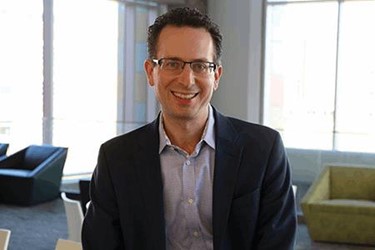Five Questions With Lilly's Daniel Skovronsky, M.D., Ph.D.

By Rob Wright, Chief Editor, Life Science Leader
Follow Me On Twitter @RfwrightLSL

Daniel Skovronsky, M.D., Ph.D., is the former CEO of Avid Radiopharmaceuticals, a company acquired by Eli Lilly and Company in 2010 for $300 million. During this year’s BIO International Convention in San Diego, the now SVP of Clinical and Product Development at Lilly sat down with me to share the experience of founding a company while still in graduate school. If you’re a subscriber, you can read that whole story in the upcoming November issue of Life Science Leader. The interview was so much fun, and Skovronsky provided so much insight, that I decided to create a couple of additional articles for our Beyond The Printed Page section, which has free access. (If you want full access to all of our great content for about $4 an issue, subscribe here.)
1. What advice do you have for company founders when buyers come knocking?
Like anything else in life, it is important to have alternatives, and you have to really believe in those alternatives. For example, when we were getting ready to sell we were also filing for our IPO. But I had another round of financing called a bridge that was already lined up and slated to close, so we were not at risk should the other options fall through. In addition, while I can’t remember how much money we had in the bank at the time, I do recall it was enough to give us a year's runway. The only negative we were facing was a potential break-up fee to those investors in the bridge should we be acquired or go with an IPO. I like having very solid alternatives, so that if I didn’t like the way a negotiation was going, I could take a different route and not feel pressured while doing so. If you do not have options, and you are running out of cash, it probably won’t turn out very well.
2. Where did you get this optionality philosophy?
That was the way I tried to run the company from day one. I consider myself to be a paranoid optimist. I always expect the worst to happen, but I am optimistic that, despite that, I will find a way to be successful. Prepare to be successful, but don’t be surprised and disrupted by the obstacles that will come.
3. Would you do anything differently in weighing and executing your company being acquired?
No. I know we made the right decision. We were launching an Alzheimer’s disease diagnostic where there was no therapeutic. While I anticipated there could be challenges with reimbursement and commercial uptake, and that it would be a long, hard, slog, part of my reasoning in opting to sell to Lilly was they had the wherewithal to invest and get the company through that period. As a stand-alone biotech, even with a lot of money in the bank and plans to raise more, it would have been far more difficult. That being said, there were some board members who thought I was crazy to sell and felt if we waited a couple more years we could have made 10 times more money. But I believe we not only would have ended up with less, but the product may not have made it to market.
4. Did you have a personal connection to Alzheimer’s disease, such as a suffering family member?
Not at the time of founding Avid Radiopharmaceuticals. However, since then I have (unfortunately) had family members with Alzheimer's disease. It was probably 1995 when I began my research in the disease area, which was driven by a combination of science breaking in an area where a solution was needed, and working with a team with the know how to make a difference. Another important factor behind the product we were developing, Florbetapir F 18 (18F-AV-45) (a molecular imaging agent to detect the presence of amyloid plaque in the brain), was that it would enable Alzheimer’s disease clinical trials. Before our product was approved, companies were flying blind; enrolling patients in clinical trials not knowing if the patient actually had Alzheimer’s.
5. How did you handle it when you got a financial term sheet?
The first term sheet I ever received was from a small angel investor group. It felt like it was written in another language. Though I did not understand it, I worked through it and learned what everything meant (e.g., participating in preferred stock). The term sheet was essentially a $1 million dollar offer. They would own the whole company and I’d be an employee. Now a lot of people said when you get a term sheet from a venture capitalist, you accept it, because they are so hard to get. I rejected it, and I would advise people 10 out of 10 times to reject such an offer. Because though this was a million-dollar deal, you don’t actually get the money, as it all goes back into the company. From my perspective, this offer would have put the brakes on Avid’s growth. We also got offers from people who said they were interested, but wanted to put in a “professional” CEO (i.e., someone with more gray hair). I rejected those as well, as I felt passionately about what we were doing, and I doubted a professional CEO could have brought that same level of passion. Companies need passionate leader who care about the science, but also understand the business well enough to make the right decisions. At Lilly we are always looking for leaders like that.
